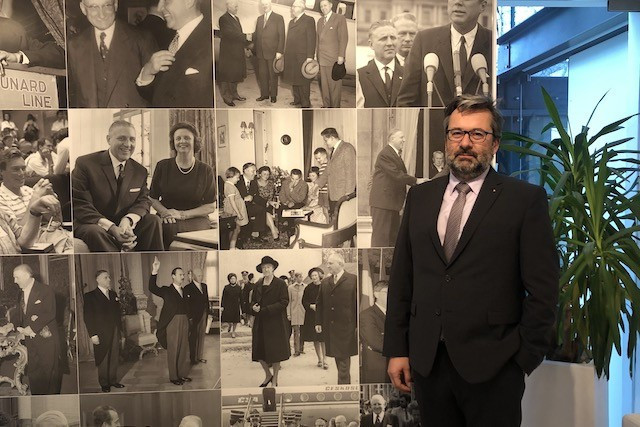Pro-Ukraine demonstrations erupted worldwide over the weekend, including in Luxembourg, which saw hundreds take to the Place Clairefontaine with their sea of European flags, with participants giving speeches in a range of languages.
On the same day, nearly 100,000 were gathered in Prague’s Wenceslas Square, with another 5,000 at Brno’s Dominican Square.
Already on Thursday when I meet with the Czech Ambassador to Luxembourg , the flags at the embassy--a property once owned by Pierre Werner, who staunchly advocated for European integration--are at half-staff in solidarity with Ukraine.
“It is particular painful for us to see history repeating itself, without humanity having learned any fundamental lessons,” Ambassador Bärtl tells Delano. “Hitler used the same narrative for the annexation of the Czechoslovak borderlands in 1938 and subsequently the whole country. We know what the appeasement policy of the time led to--neither England nor France gained the respect of the Nazis, nor enough time to prepare for further expansion, for which the Nazis could already use tanks captured in Czechoslovakia.”
The Czech foreign minister Jan Lipavský has similarly stated, “I am appalled by the unacceptable behaviour of the Russian Federation, which has nothing in common with modern European politics. We stand with our allies behind Ukraine.”
Upon taking on his role, Ambassador Bärtl that Czechs “are quite sensitive about democratic issues”, referring to the “Velvet Divorce” which split Czechoslovakia at the start of 1993, a leadup from the communist putsch of February 1948.
“In 1968, the Prague Spring threatened the core ideas of the communist camp, which the Russians punished with the arrival of tanks and shooting at civilians,” Ambassador Bärtl adds. “The Russians stifled the revival process for the next 20 years, during which time Luxembourg took in many Czechoslovak refugees. Now we are preparing for the arrival of refugees from Ukraine…”
Highlighting bilateral relations
Despite having fewer events over the past couple of years because of covid restrictions, the Czech Embassy is anticipating a wide range of events linked to 100 years of Czech-Luxembourg relations--and perhaps this year it will be all the more important to highlight these bilateral relations.
Among the events under planning for 2022 is the inauguration this autumn of a street dedicated to Václav Havel, last president of Czechoslovakia and first president of the Czech Republic, in collaboration with the Fonds de Kirchberg. The embassy also anticipates art exhibition, concerts and other events highlighting the bilateral relations--more information will be forthcoming on Delano.
Ambassador Bärtl is also looking forward to this July, when the Czech Republic assumes presidency of the Council of the EU which it will, in turn, pass on to Sweden at the start of 2023.
Updated on Monday, 28 February, 1pm to correct a typo
